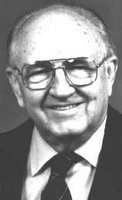
The man regarded as the father of creationism, or "creation science," has died at 87, after a series of small strokes at a San Deigo hospital.
Henry Madison Morris, Ph.D (Oct. 6, 1918 — Feb. 25, 2006) was an American young earth creationist, Christian apologist and hydraulic engineer and engineering professor.
Shortly after graduating from his native Texas's Rice University with a bachelor's degree in civil engineering in 1939, Dr. Morris became a Christian and adopted a literalist interpretation of an inerrant Bible.
He worked in El Paso, Texas as a hydraulic engineer as well as taught civil engineering at Rice University and the University of Minnesota, where he received a master's degree in hydraulics and a Ph.D in hydraulic engineering (with minors in geology and mathematics). He was a professor of civil engineering at Lafayette University in New Orleans from 1951 until 1956, when he became professor of applied science at Southern Illiniois University for two years, then became professor and chairman in civil engineering at Virginia Polytechnic Institute and State University.
Clearly an educated man, he apparently tried to mix his book learning with The Book learning. In 1961 Dr. Morris, along with Bible scholar John C. Whitcomb, wrote The Genesis Flood, which focussed on the concepts of creation science and flood geology. Morris admitted in his book that he had been influenced strongly by George McCready Price, a Canadian Seventh-day Adventist anti-evolutionist author who died in 1963 at age 93.
According to Wikipedia:
Morris believed that science cannot be used to study God's creative act. Instead, he believed that any evidence of past events must be interpreted through a non-scientific framework. For example, in his book Scientific Creationism he stated:
"...[I]t must also be emphasized that it is impossible to prove scientifically any particular concept of origins to be true. This is obvious from the fact that the essence of the scientific method is experimental observation and repeatability. A scientific investigator, be he ever so resourceful and brilliant, can neither observe nor repeat origins!
"This means that, though it is important to have a philosophy of origins, it can only be achieved by faith, not by sight."
In this, Morris set himself against many philosophers of science, who see no important distinction between past and present data, but instead use falsifiability and testability as the demarcation criteria for science.
Even though Morris claimed that science can't answer the question of whether the Bible's creation story is literally and historically true, he had written several books about scientific evidence that he believed fits better into a creation framework than the mainstream science framework. Many creationists (for example, Answers in Genesis) have followed Morris' lead and now make a distinction between what they call operational science and origins science.
The mainstream scientific community rejected both his philosophy of science and his creation evidence as pseudoscience, and claimed that Morris' representation of evolution as a complete religious system is a strawman. Morris' position had also been the subject of debate among Evangelical scholars of the Old Testament and among Evangelicals working in various fields of science.
The work The Genesis Flood by John C. Whitcomb and Henry M. Morris has been criticized for taking quotes out of context and completely misquoting sources.
We predict that Dr. Morris's birthday of October 6 will be proclaimed a national holiday by fundamentalist and evangelical Christians, replacing or blending with Columbus Day as the under-used mid-autumn holiday of choice. After all, Columbus was a bit off course, too. He was looking for India when he bumped into America, which had, of course, actually been discovered by white men at least as early as 1000 A.D., and inhabited by the red race for millenia.
History has a way of being meaningless sometime. Henry Morris, like all men, deserves to be remembered. His young earth creationist theories? Not so much....
Henry Morris | Creationism | Creation Science
Seventh Day Adventist | Genesis Flood | Intelligent Design
No comments:
Post a Comment
Note: Only a member of this blog may post a comment.